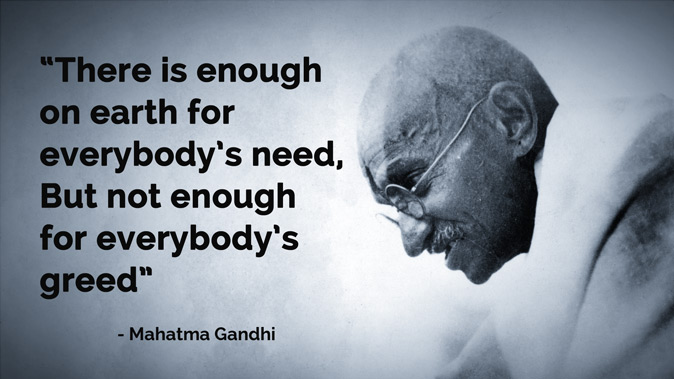
Gandhi is not well-known for his views on the environment. Indeed, in his vast output, there is little explicit mention of the environment. Yet, in Gandhi’s views, one finds a lot that is relevant to environmentalism. Like most great thinkers, Gandhi’s views are flawed; however we learn a lot by studying his views critically.
Let us begin by examining Gandhi’s views on materialism and consumerism. In his lecture on economic and moral progress delivered in 1916, he offers one of the most searing critiques of materialism: “This land of ours was once, we are told, the abode of the gods. It is not possible to conceive gods inhabiting a land which is made hideous by the smoke and the din of mill chimneys and factories and whose roadways are traversed by rushing engines dragging numerous cars crowded with men mostly who know not what they are after, who are often absent-minded, and whose tempers do not improve by being uncomfortably packed like sardines in boxes and finding themselves in the midst of utter strangers who would oust them if they could and whom they would in their turn oust similarly. I refer to these things because they are held to be symbolical of material progress.”[i]
The sentiment reflected in the above lecture is reflected throughout Gandhi’s work. Here are Gandhi’s views on machinery from 1924 worth quoting in full[ii]: “What I object to, is the craze for machinery, not machinery as such. The craze is for what they call labor-saving machinery. Men go on ‘saving labor’ till thousands are without work and thrown on the open streets to die of starvation. I want to save time and labor, not for a fraction of mankind, but for all. I want the concentration of wealth, not in the hands of the few, but in the hands of all. Today machinery merely helps a few to ride on the backs of millions. The impetus behind it all is not the philanthropy to save labor, but greed. It is against this constitution of things that I am fighting against with all my might.”
First of all, credit where it is due. His description of “..rushing engines dragging numerous cars crowded with men mostly who know not what they are after, who are often absent-minded, and whose tempers do not improve by being uncomfortably packed like sardines in boxes and finding themselves in the midst of utter strangers who would oust them if they could and whom they would in their turn oust similarly” might well have been written about Wall Street today. How prescient of Gandhi to anticipate the pathetic meaninglessness of life that is the norm in modern industrial society.
Yet, the word “capitalism” is conspicuously absent from Gandhi’s views. The reader is constantly left wondering whether the legitimate critiques he offers of industrialism are rooted in human attributes such as greed or whether they are the outcome of a particular set of economic institutions that we collectively call capitalism. For instance, the entire lecture on and moral progress (from which we have cited above) poses a choice between economic progress, identified with a particular way of attaining material progress, and moral progress. The question of alternate ways of attaining material progress is never posed, let alone addressed. In the book “Hind Swaraj”, Gandhi has the following to say about lawyers[iii]: “The lawyers, therefore, will as a rule, advance quarrels, instead of repressing them. Moreover, men take up that profession, not in order to help others out of their miseries, but to enrich themselves. It is one of the avenues of becoming wealthy, and their interest exists in multiplying disputes.” The critique is of course legitimate, but as elsewhere in Gandhi’s analysis, it is rooted to human nature without bringing up the possibility that the issue may be with the legal profession as practiced in a particular set of institutions, rather than the legal profession itself. Bringing up the possibility then leads to other considerations such as for instance, maybe the problem is in said set of institutions, rather than human nature.
Gandhi’s line of argument is common within the environmental movement. We often hear criticisms of materialism without a clearer consideration of the economic institutions that lead to said materialism. It is worth noting that there is in fact a moral basis to desire material progress, namely diversity (not to be confused with PC notions of diversity used in liberal discourse.) If we believe that human beings have diverse talents, then we ought to aim for an economic system that provides opportunities for diverse talents. It is hard to see how such opportunities can be available absent a minimum level of material progress.For instance, film-making is a genuine art-form that would not exist absent the availability of various technologies such as cameras and film. If one believes that diversity in the economy is fundamentally at odds with sustainability, then one ought to argue why. It cannot be taken as a given.
Having said all of the above, there is an element in Gandhi’s views that goes deeper than a critique of capitalism, and is hence worth thinking about. Gandhi saw himself as a critic of the Enlightenment. Gandhi scholar AkeelBilgrami has traced the history of Gandhi’s views[iv] and found that it has “striking antecedents in a tradition of thought that goes all the way back to the second half of the seventeenth century”. As Bilgrami points out, there were two strains of Enlightenment thought. One dominated by figures like Newton and Boyle viewed matter and nature as “brute” and “inert”. The alternate view saw nature as a habitat that is suffused with value, “shot through with an inner source of dynamism”. The latter view, it must be noted, celebrated the achievements of the new science, and hence cannot be dismissed as a Luddite reaction to the science. Over time, the metaphysical approach espoused by Newton and Boyle,“won out… and became official only because it was sold to the Anglican establishment and, in an alliance with that establishment, to the powerful mercantile and incipient industrial interests of the period in thoroughly predatory terms – termswhich stressed that how we conceive nature may now be transformed into something, into the kind of thing, that is indefinitely available for our economic gain by processes of extraction, processes such as mining, deforestation, plantation agriculture…” It has to be emphasized that the views of Gandhi and the other Enlightenment critics referred to by Bilgrami were not opposed to taking from nature. After all, taking from nature is as old as humanity itself. However, in the past, there was a sense that any taking from nature must be accompanied by a reciprocation of some sort, meant to restore the balance in nature. What the new metaphysical approach brought about, according to Bilgrami, was the “unthinking and yet systematic” exploitation of nature.
The views Bilgrami refers to above are found not only in Gandhi’s work but in actual environmental movements. Environmental activist Vinod Raina, surveying various environmental movements in India and wondering what keeps people going on for years, has written[v] about the cultural beliefs that provide the “strength and sustenance of the movement”. Referring specifically to the Narmada BachaoAndolan, a movement opposed to building large dams on the Narmada river, he writes: “numerous songs, stories and literature..(about rivers).. form an integral part of the cultural milieu of the people living close by. In a majority of these songs, specific to fishfolk, peasants and women, the image of the river is mostly of that of a provider, a giver. In many women’s songs the allusion is to that of an empathiser; it is only the river that will understand the sadness of a woman’s existence, and its constant flow signifies steadfastness, a constant companion whose life sustaining qualities act as a balm in her life.” He concludes that the sustained opposition to large dams is ultimately drawn from the above reverence held for rivers where large dammingis seen as the rape of a virgin goddess.
Just like with Gandhi’s views, it is easy to dismiss such considerations as expressed above as misplaced irrationality. Doing so is not only wrong, but also deeply patronizing. It is the view of this article that beliefs such as the above do fall within the realm of rationality. There is no reason to believe that the movement opposed to large dams is opposed to the benefits of technology like electricity. They do however reflect the same views as those of the radical critics of the Enlightenment that Bilgrami writes about. They reflect a view of nature as “suffused with value”, which in the case of decisions such the one to construct large dams, leads to fundamentally different interpretations of the precautionary principle.
After centuries of “development” that have led to the extreme environmental catastrophes of the Anthropocene period, the least that we can do is to pay attention to these critiques.
[i]Quoted from Gandhi’s lecture titled “Does economic progress clash with real progress?” printed in the centenary edition of “Hind Swaraj” edited by Anthony J. Parel, Cambridge Texts in Modern Politics.
[ii] Also printed in the centenary edition of “Hind Swaraj” cited above.
[iii] Quoted from the chapter titled “The condition of India: lawyers” in “Hind Swaraj”.
[iv] Most of Bilgrami’s views quoted in this article are drawn from his essay titled “Gandhi, Newton and the Enlightenment” published in Philosophic Exchange, Vol 38, No. 1.
[v]“Why People Oppose Dams. Environment and Culture in Subsistence Economies” by Vinod Raina. http://www.narmada.org/articles/why.people.oppose.dams.html
Raghav Kaushik is a writer from USA
















































